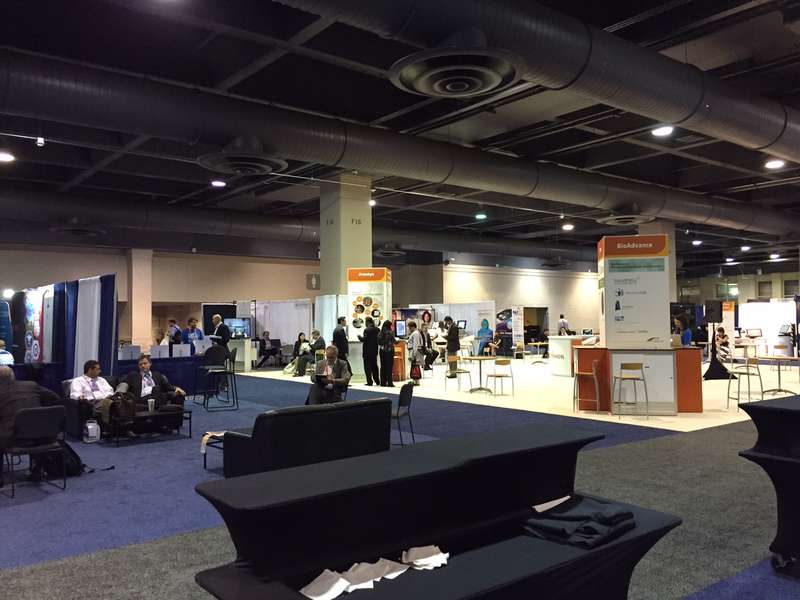BIO 2015: Three Intriguing Biotech Companies Featured at the Convention
 The 2015 BIO International Convention has been underway for the past four days in Philadelphia. Top scientists, research universities, biotechnology executives, pharmaceutical companies, and more came from all over the world to learn about a variety of topics, like how internet-connected devices could alter the future of disease treatments or how gene editing technology may repair broken DNA.
The 2015 BIO International Convention has been underway for the past four days in Philadelphia. Top scientists, research universities, biotechnology executives, pharmaceutical companies, and more came from all over the world to learn about a variety of topics, like how internet-connected devices could alter the future of disease treatments or how gene editing technology may repair broken DNA.
A staple of the conference is the selection of biotech companies who showcase their services in an area of the convention center called “BIO Metropolis.” Bioscience Technology (BST) highlighted three businesses that caught our eye.
Click Therapeutics
Click Therapeutics is working on a handful of health tools called “digital therapeutics.” These are mobile applications geared toward helping people with brain disorders and “neuropsychiatric dysfunction,” according to the company’s website.
There are four apps dedicated to helping with the following conditions:
- Clickmentia: an iPad-only application to help people diagnosed with Alzheimer’s disease improve behavior symptoms and everyday functions. Some other features of this app include continuous care schedule to share responsibilities among care givers as well as compassion-based messaging to ultimately reduce stress levels and anxiety.
- Clickotine: Click’s website says this particular app could help people stop smoking through a platform that was built based on clinical research, which shows that behavioral and cognitive modification coupled with therapeutic breathing exercises may stop addiction.
- CT-401 and CT-301: Both of these products are iPhone and iPad apps. CT-401 is being developed to target symptoms of ADHD whereas CT-301 is geared towards targeted symptoms from traumatic brain injuries, but Click’s site doesn’t specific how these apps can treat these conditions.
The company has not announced a release data yet for these four apps because they are all in different stages of development. CT-301, CT-401, and Clickmentia are still in the beginning R&D; stages whereas Clickotine is patent pending and moving towards a pilot study.
You can pre-register to download the apps on the Click website for when they become available.
Cerora
A few people at the conference were walking around with a device called the Cerora Borealis, a headset built by healthcare information technology company Cerora in Bethlehem, PA.
The device wraps around the top of a person’s head and can specifically evaluate for the risk of concussion and Alzheimer’s disease by obtaining auditory and cognitive data through a combination of biosensors and a proprietary software program.
An electroencephalogram housed on the headset can record electrical activity occurring in the brain during physical activities. The diagnostic tool can wirelessly sync with a number of blue-tooth enabled technologies like laptops and PC’s running the Cerora software. Microphones built into these products can record someone’s voice to scan for any fluctuations in speech patterns.
All of this information is automatically compiled and compressed through the Borealis software in order to provide a comprehensive analysis of neurological health.
Currently, the team at Cerora is working with a number of partners to enhance the software and headset to gain clearance and approval from the U. S. Food and Drug Administration. It is still in the investigational phase because the team at Cerora is testing the potential of the headset and software in other therapeutic realms.
READ MORE: Five Biotech Startups to Check Out This Month
Figure 1
Figure 1, which has been called the “Instagram for Doctors,” had a booth in the conference hall.
The iPhone and Android app enables members of the healthcare community to share images of clinical cases to get feedback on possible diagnoses and treatments from their colleagues. Users will have broad access to a number of previously-uploaded pictures grouped together based on anatomy and specialty. These can include X-rays, charts, and de-identified patient photos filled with annotations.
The privacy of patients can be upheld on this platform. Physicians interested in using this app can have patients sign an in-app consent form and activate automatic faceblocking to ensure a patient can’t be identified.
You can download the app here.



